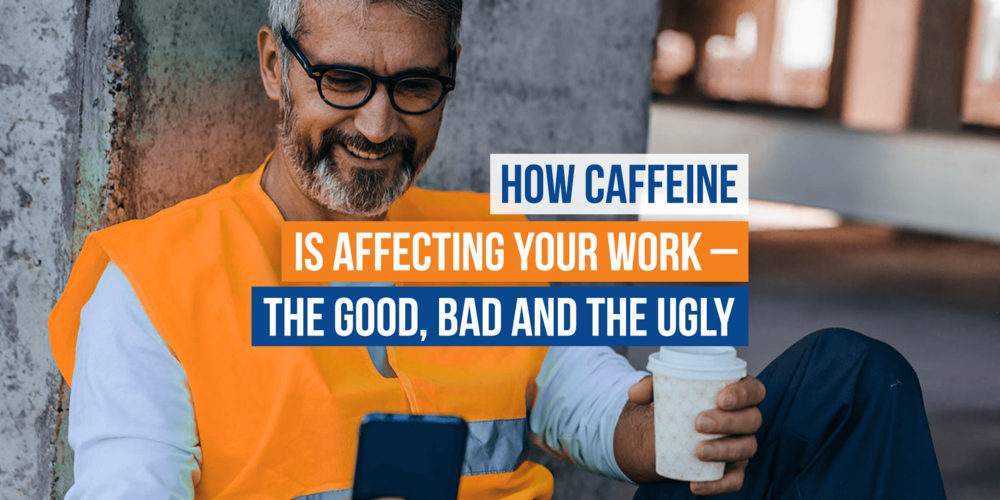Three in four Australians consume the world's most popular psychoactive drug on a daily basis – caffeine! Whether consumed in coffee, tea or energy drinks, 27% of us indicate we can't live without it. So, what does caffeine really do to our bodies and minds at work? Here we look at the good, bad and downright ugly side-effects of caffeine at work.
The good - if you drink a cup of coffee before reading this article, you'll recall it better
A new study from Johns Hopkins University suggests that caffeine can assist in your ability to recall information. The study divided the participants into two groups – giving one group caffeine tablets, and the other a placebo. The next day, they asked participants to recall the information shared the previous day. The group who had caffeine had significantly better results. The study even worked out the optimal dosage to get the enhancement: about 200 milligrams, which you'll find in a strong cup of coffee.
The good - caffeine Increases willpower
Caffeine can strengthen your willpower and self-control , especially when you're tired. Willpower is essential in the workplace as it is a factor in making effective decisions. Through a lack of willpower, you could end up compromising your values, cracking under pressure in negotiations or taking on a new project at inopportune times.
The bad – caffeine doesn’t increase creativity, as once thought
For centuries, coffee has been associated with creativity, thanks to the likes of famous artists and their extreme consumption. Famous writer Voltaire was known to drink 40-50 cups of a chocolate coffee mixture a day! However, The University of Arkansas has recently proven that while caffeine increases the ability to focus and problem solve, it doesn't stimulate creativity – as once believed.
The bad – the rollercoaster effect
Coffee, tea and other caffeinated beverages are known to boost energy levels. However, you can feel more tired when its effects wear off. Of course, you can continue to drink more caffeine throughout the day to avoid the rebound effect – but this can lead to the consumption of high doses which may have longer-term health impacts.
The ugly – caffeine-induced stress and anxiety
Caffeine is known to increase alertness as it blocks a brain chemical that makes you feel tired. At the same time, it triggers a release of adrenaline. Extremely high intakes of caffeine reportedly cause nervousness, jitteriness and anxiety-like symptoms. One study in 25 healthy men found that those who ingested approximately 300 mg of caffeine experienced more than double the stress of those who took a placebo.
The ugly – higher risk of workplace incidents
It's no secret that coffee later in the day can affect our ability to fall asleep as well as the quality of our sleep. However, the impact of a poor night's sleep may be more detrimental on a workday than you think. Sleep-deprived workers have difficulty concentrating, learning and communicating. Highly fatigued workers are 70% more likely to be involved in workplace accidents when compared to those with lower fatigue levels.
Don't worry, no one is taking your morning cuppa away, but with that being said, it's essential to be aware of the pros and cons of coffee. Like any substance, the effectiveness of caffeine is dependent upon dosage, body type, weight, age, time of day, and, yes, the quality of your sleep.
Light to moderate caffeine intake can provide several impressive performance benefits on the job – not to mention the social connection it helps create. However, high doses can lead to side effects that interfere with your workday and potentially even cause serious issues.
The impact of caffeine varies substantially between individuals so to get the benefits without the undesirable effects, give thought to your sleep, energy levels, performance at work and balance your intake if needed.
If you are open to new opportunities, contact a recruitment agency like Trojan Recruitment Group and receive advice from the experts in labour-hire, permanent and contract staff.
I https://mccrindle.com.au/insights/blogarchive/australian-attitudes-towards-coffee/
II https://www.youtube.com/watch?v=YuJOhpNS0IY
III https://www.fastcompany.com/3024975/caffeine-destroyer-and-enhancer-of-memory
IV https://fortune.com/2015/09/29/coffee-workplace/
V https://www.sciencedaily.com/releases/2020/03/200305135050.htm#:~:text=creativity%2C%20study%20indicates-while%20the%20drug%20is%20known%20to%20increase%20focus%2C%20alertness%20and,had%20not%20been%20studied%20previously&text=Summary%3A&text=Caffeine%20increases%20the%20ability%20to,it%20doesn't%20stimulate%20creativity.
https://www.healthline.com/nutrition/caffeine-side-effects


